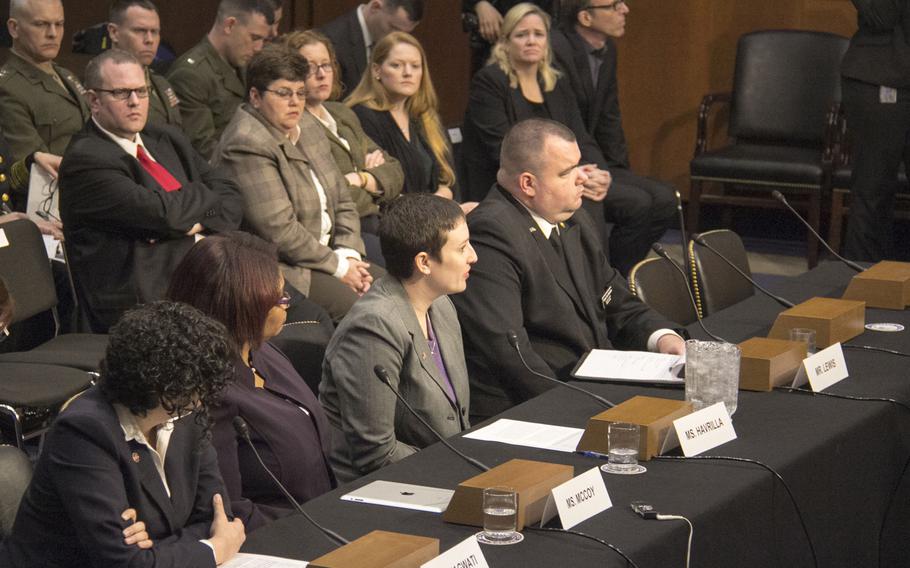
Military sexual assault victims and their advocates testify before the Senate Armed Services Committee's Subcommittee on Personnel in Washington, March 13, 2013. (Rick Vasquez/Stars and Stripes)
WASHINGTON — A little-used military commander’s prerogative to overturn verdicts in military court cases is drawing intense scrutiny from Congress and outside legal experts in the wake of a controversial decision to reverse an Air Force officer’s conviction for sexual assault.
While some military justice experts have long maintained that the unusual authority of a commander to intervene in a legal case is critical to maintaining good order and discipline, others say it is outdated and desperately in need of reform.
“It’s an insult to the rule of law” that someone with no legal training or background has full control of the outcomes of legal proceedings, said Michel Drapeau, a professor of military law at Ottawa University in Canada.
Last month, a U.S. Air Force lieutenant general overturned the sexual assault conviction of a fighter pilot and acting inspector general, leading to calls for reform to a system that allows top commanders to lessen or vacate sentences before any judicial appeals. Defense Secretary Chuck Hagel has vowed to review the case and the ability of commanders to overturn courts martial results.
But it isn’t the first time a commander has changed the outcome of a high-profile case. In 2011, the former command chief of Air Force Materiel Command was convicted of 15 counts of sexual misconduct and sentenced to 20 months in prison and a dishonorable discharge. Later, the convening authority reduced the man’s prison time to four months and overturned the discharge, instead sentencing him to a bad-conduct discharge.
In 2009, a convening authority reduced the sentences of two soldiers convicted of murder for their roles in the killing of four Iraqi detainees near Baghdad. The soldiers’ discharges were also changed from dishonorable to bad conduct.
And in 2007, the convening authority overturned an airman’s conviction of indecent acts with a child and reduced his sentence.
On Wednesday, Maj. Gen. Vaughn Ary, staff judge advocate to the Commandant of the Marine Corps, told a Senate subcommittee the ability of a commander to overturn a conviction is critical.
“I think for so long as we hold our commanders accountable for everything that a command does or fails to do, then they must have these types of authorities,” the Marine officer said. “They need to be able to hold everyone in their unit accountable, to preserve that good order and discipline to accomplish their mission.”
Lt. Gen. Richard Harding, judge advocate general of the Air Force, said the authority is part of the reason the American military succeeds in battle.
“A convening authority’s ability to exercise some accountability on every aspect of an airman’s, soldier’s, sailors, Marine’s behavior is incredibly important, creating a responsive, disciplined force,” he said.
Eugene R. Fidell, who teaches military justice at Yale Law School, said he was not moved by the arguments in favor of keeping the centuries-old rule.
“If that’s the best case you can make, Congress has to act, because it’s not persuasive,” he told Stars and Stripes. “In 1775, this may have made excellent sense … but a lot has changed.”
Fidell pointed out that the military justice system already has an appeals process and parole board, and the President has the ability to grant pardons and commutations on military cases.
Drapeau, a retired military officer with more than 30 years of service, said Canada removed the authority to call for a court martial from the chain of command at least 15 years ago and that other countries, including the United Kingdom, Ireland, Australia and New Zealand have moved military prosecution out of the departments or ministries of defense.
He called the American system “Victorian,” and an insult to judicial independence.
Commanders love it, Drapeau said, because “it gives them the flexibility to massage the justice system to their view of the universe, but that’s not the way it works in a democracy.”
Sen. Lindsey Graham, the South Carolina Republican and military lawyer in the Air Force Reserve, pointed out Wednesday that very few convictions and sentences are overturned by the convening authority and deemed the rule important to good order and discipline.
But Sen. Kirsten Gillibrand, D-N.Y., said the statistics show the existing rules for convening authority constitute “the exact opposite.”
“If you think you are achieving discipline and order with your current convening authority framework, I am sorry to say you are wrong,” she told the lawyers.
hlad.jennifer@stripes.com Twitter: @jhlad